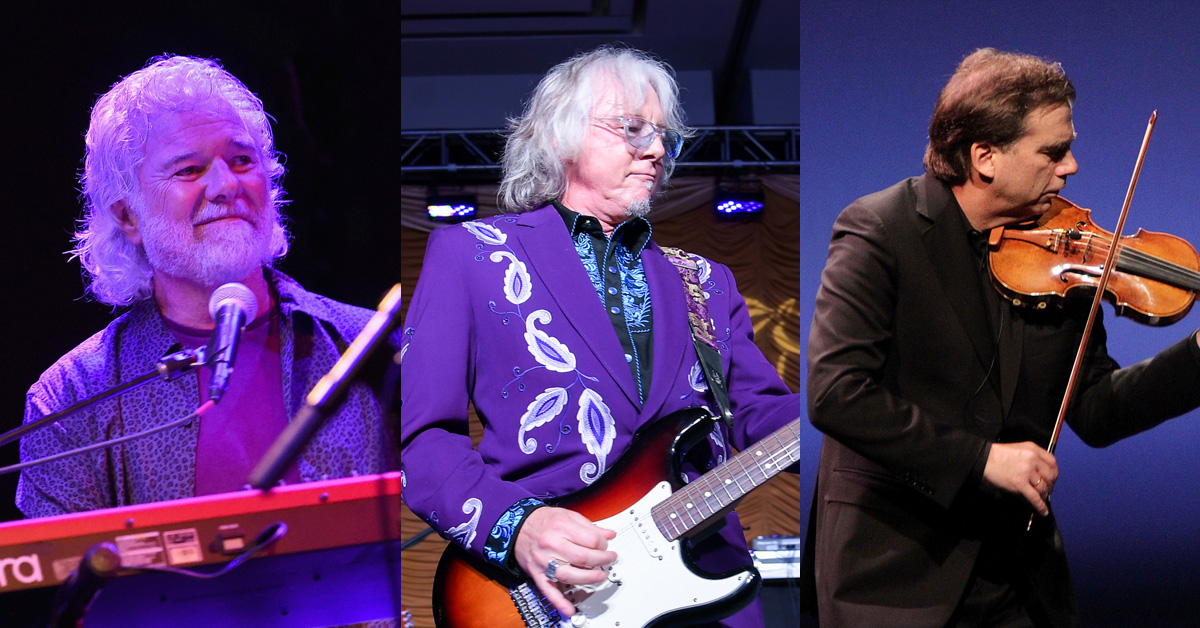
Leavell: Rick Diamond/Getty Images for Mother Nature Network; Mills: Michael Loccisano/Getty Images for Unbridled Eve; McDuffie: Maury Phillips/Getty Images for The Broad Stage
Rock and Roll Hall-of-Famer Mike Mills is a busy man. In addition to summer outings with acts such as the Minus 5 and the Baseball Project (including gigs in Cleveland, Ohio during MLB’s All-Star Weekend and for Braves fans at Atlanta’s Coca-Cola Roxy at SunTrust Park), the bassist joined two of his fellow R.E.M. cofounders, guitarist Peter Buck and drummer Bill Berry, onstage at the Fox Theatre September 13 for a benefit to preserve regional performing arts venues.
On September 29 at Atlanta Symphony Hall, Mills kicks off a mini-tour of A Night of Georgia Music, his latest venture with Rolling Stones keyboardist (and Allman Brothers Band alum) Chuck Leavell, world-renowned violinist Robert McDuffie, a full band, and players from the McDuffie Center for Strings at Mercer University. The program features fresh instrumental versions of classic Georgia-themed hits ranging from “Georgia on My Mind” and “Midnight Train to Georgia” to “Hey Ya!” and “One Way Out” and revisits the original six-movement Mike Mills Concerto for Violin, Rock Band, and String Orchestra (which debuted in 2016). Mills calls his new ensemble’s meshing of rock and classical elements a “Venn diagram” of musical textures.
Atlanta caught up with Mills, Leavell, and McDuffie to find out how this concert mashup came together.
Macon, Georgia is a nexus for the three of you. Mike, you and Bobby met at church there in the 1970s and Chuck, you left Birmingham, Alabama, to work with the Allman Brothers and the Capricorn Records label in Macon around that time, too. How did music bring y’all together?
Mike Mills: I’ve known Bobby since seventh grade, and it was always fascinating to me that we both had a connection to classical music. My connection was more through my father being a dramatic tenor and listening to a lot of classical music, and Bobby’s connection was obviously through playing classical violin. But my family would go to Bobby’s house after church on Sunday and we’d listen to the J. Geils band or whatever [pop and rock songs] came on the stereo. I recognized that music didn’t have to be one [genre] or the other. Bobby went off to Juilliard about halfway through high school, but our mothers kept in touch. Over the years, we had parallel arcs of music careers and we both became very successful at what we did.
Robert McDuffie: My mom was the organist and choir director at First Presbyterian Church, and Mike’s father was her tenor soloist, and they presented some awesome music—everything from Brahms’s A German Requiem to the Seven Last Words of Christ by Théodore Dubois. Mike and I were in youth and handbell choirs together. He was not yet the cool rock-and-roller he is today. He was a little nerdy [laughs], but so appealing and exceedingly kind. I left Macon at 16 and got a call from Mike several years after that [in NYC]; he was telling me about this new band called R.E.M. and asked if I would come hear them play. I think they went on at 1 or 2 A.M., so I just wished him luck. Later, I remember walking into LaGuardia and looking over at the newsstand, and there’s Mike and the guys on the cover of Rolling Stone with the headline, “R.E.M.: America’s Best Rock and Roll Band.” We reconnected around that time.
Chuck Leavell: Before R.E.M. was formed, Bill Berry was an office runner for Capricorn Records [in the Paragon Agency]. So I knew about Bill and later, as R.E.M. started to have success, the band and I would bump into each other. It hasn’t been until recent years that Mike and I have gotten to know each other better, and to a degree it’s been through [our mutual relationships] with Bobby and the agent Buck Williams. As far as working together, Mike has performed his concerto before [in 2016], but then came this idea of bringing me into the picture to celebrate music from Georgia, about Georgia, and written by Georgia writers and artists.
Chuck, when you first came to Georgia as a young musician, did you have a sense of the magnitude of the state’s musical history?
Leavell: I was definitely aware. You’ve got Little Richard, James Brown, Otis Redding—all had strong roots in Georgia. When the Allman Brothers Band became successful, that just added another dimension. But the history’s been here for a long time.
How did you narrow down the set list for A Night of Georgia Music?
Mills: A couple of the songs were obvious: “Midnight Train to Georgia” is one of the most beautiful songs ever written. Gladys Knight [who had a Billboard number-one hit with the Jim Weatherly-penned tune in 1973] is from Atlanta and the song references Georgia. I wanted to make the list as [stylistically] diverse as possible. Of course, [Hoagy Carmichael’s] “Georgia On My Mind” has to be in there, because Ray Charles was from Albany. I had to extrapolate in my mind if each song could translate into an instrumental version with a rock band, orchestra, and violin.
Chuck, you’ve been a keyboardist for the Rolling Stones since 1982 and just got back from a summer tour that received rave reviews. How will this tour contrast with those experiences?
Leavell: We were mighty glad not only to salvage the tour [after Rolling Stones singer Mick Jagger’s heart surgery in April], but also to sell it out. It was a tremendous journey, and everybody wound up happy and healthy. [A Night of Georgia Music] is such a unique presentation of these [Georgia-themed] songs, and I love that. My last record was a 17-piece big band album with brass! This will be with an orchestra, and that’s what gets me excited. Is it great to play with the Rolling Stones? Of course, but to be able to slide into these other situations and do something creative with it, it’s a real joy. I’ve also had past opportunities with bands like Sea Level, the Allman Brothers, and Eric Clapton, but [this show] is a chance for Bobby and me to have a musical dialogue back and forth as featured performers. Let’s just say that [the combination of my] rock-and-roll piano and Bobby’s classical violin background is going to be an interesting musical conversation.
Bobby, switching gears to the Mike Mills Concerto, you’re the one who asked Mike to write it. You travel in the highest classical music circles and own a 1735 Giuseppe Guarneri del Gesù violin once played by Nicolò Paganini. Tell us how the Concerto came together.
McDuffie: I still play classical music by dead European males [laughs], but I always felt I would find my voice in American music. I consider Philip Glass to be America’s Vivaldi, so I went to him about 10 years ago and asked him to write the American Four Seasons. He came through with this fabulous piece, and we’ve had a great run—we’re now up to like 95 performances in 50 cities. In the traditional sense, you go to a contemporary composer, you commission a piece, and you may get a handful of performances if you’re lucky. I don’t want to learn a piece just to play it three or four times. I want it to endure and be personal. Mike Mills is one of America’s greatest composers, and R.E.M. had just split, I think, in 2011. He wrote so beautifully for R.E.M. and, I thought, if we got the right arranger, why not have them enter the classical sphere and merge the two worlds? I had dinner with Mike and his manager [Bertis Downs] at the National in Athens and threw this idea out to them. There was silence from Mike after I brought it up, and I thought, oh no, this was a huge mistake. But then he said, ‘I’ve already got a tune!’ And he just dove in, embraced it, and came up with this fabulous piece. [The Mills Concerto premiered with the Toronto Symphony in 2016], and we’ve played it well over 20 times now.

Photograph by Rick Diamond/Getty Images for Mother Nature Network
Mike, [R.E.M. frontman] Michael Stipe once said in an interview that your love of the Ramones is what brought “hyper-animated 16th and 32nd notes” to R.E.M.’s sound. That’s actually a perfect description of what I now hear in the energetic movements of your Concerto.
Mills: I have to give huge credit to our arranger David Mallamud. He helped me translate my ideas into violin and string orchestra music. I’m a melody guy, I always have been. But I’ve never written that deeply for string instruments. He and I sat in hotel rooms, and on the phone, and worked out the arrangements for the orchestra and for Bobby [on violin]. It’s fun to see my ideas go through his classical training and become the things they [are] onstage.
Are you fans of Paul McCartney’s classical works such as The Liverpool Oratorio or Ocean’s Kingdom?
Mills: To be honest, I’ve only given them a casual listen. That’s probably to my discredit, but I’m afraid I’d be daunted by it. His basslines and [The Beatles] are huge influences on me. There are some intrepid rockers out there who are trying to do different things. I know my friend John Paul Jones [Led Zeppelin] is writing an opera. He did the string writing and arranging for [R.E.M.’s 1992 album] Automatic for the People, which was brilliant.
McDuffie: Does Billy Joel count? He’s an amazing piano player and has written some really beautiful solo piano works. In his shows he brings out Itzhak Perlman and Lang Lang. He certainly loves and appreciates the classical part. McCartney probably has a tougher time than Mike Mills [in writing his works]. McCartney is an absolute genius, but he can’t read music. We share a Pilates teacher in New York, and Paul is the most kind individual. I feel blasphemous dissing him a little [laughs], but Mike actually reads music. What we’re doing with the Concerto and A Night of Georgia Music is creating something new [between the worlds of rock and classical]. At the end of the day, though, this [feels like] a rock show.
Mike, the final movement of your Concerto is called “You Can Go Home Again.” Is that a nod to Georgia?
Mills: That’s exactly right. It has some dual guitar lines in it a la the Allman Brothers. It has a little of that Georgia feel to it. I’m thinking about Bobby and I growing up together and then leaving town to go pursue our separate careers and then circling back to be friends again and creating this music together, a lot of which is connected to Macon. Bobby opened the McDuffie Center for Strings at Mercer University, and we’ll have some students and alumni from the center in our string orchestra [for this performance]. All of which speaks to the fact that you can go home again. I thought that was an appropriate title for the last movement.
Interviews have been edited for length and clarity
If you go: A Night of Georgia Music will play at Atlanta Symphony Hall on Sunday, September 29 at 8 p.m. Tickets range from $29-$250 and are available on Ticketmaster and at the venue box office. The tour then moves on to the Lyric Theatre in Birmingham, Alabama, on October 2, to the Lucas Theatre for the Arts in Savannah on October 4, and to the Miller Theater in Augusta on October 5.













